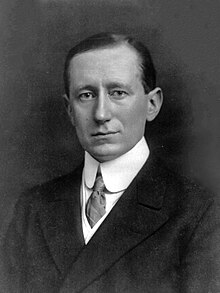Italian inventor and radio pioneer (1874-1937) From Wikipedia, the free encyclopedia
Guglielmo Marconi (25 April 1874 – 20 July 1937) was an Italian inventor and electrical engineer. He was a pioneer of long-distance radio transmission.[1] which he used to build up a radio telegraph system. Marconi is often named as the inventor of radio. He shared the 1909 Nobel Prize in Physics with Karl Ferdinand Braun.[2][3][4]
Guglielmo Marconi | |
|---|---|
 | |
| Born | 25 April 1874 |
| Died | 20 July 1937 (aged 63) Rome, Italy |
| Alma mater | University of Bologna |
| Known for | Radio |
| Awards | Nobel Prize for Physics (1909) |
| Signature | |
Much of Marconi's work in radio transmission was built on previous experimentation,[5] and work by others. When he was twenty years old, based on the experiments of Hertz, Popov, Lodge, Bose, and Tesla, Marconi began his own experiments.
As an entrepreneur, businessman, and founder of The Wireless Telegraph & Signal Company in Britain in 1897, Marconi became wealthy in the business of radio, mainly for ships at sea.[6][7] In 1924, he was ennobled as Marchese Marconi. Back in Italy, he went on to become a member of the Grand Council of Fascism.
Seamless Wikipedia browsing. On steroids.
Every time you click a link to Wikipedia, Wiktionary or Wikiquote in your browser's search results, it will show the modern Wikiwand interface.
Wikiwand extension is a five stars, simple, with minimum permission required to keep your browsing private, safe and transparent.